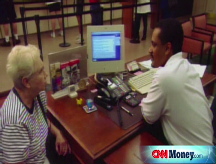Warning: Extra yield - extra risk
Just ask anyone who put cash into ultra-short-term bond funds.
(Money Magazine) -- When you stash your cash away, you probably don't give that much thought to the risks involved. After all, it's safe, liquid cash - not shares of Lehman Brothers.
But with financial hurricanes pounding the markets and your portfolio, you want to be sure the money you need in the next year or two is tucked away in a truly safe haven.
So which of your cash accounts meet this definition? Not as many as you once believed. As it turns out, even money-market funds aren't as safe as you may have assumed.
But there has also been a scare in so-called cash alternatives, which are marketed to investors seeking slightly higher yields than traditional cash accounts provide.
Case in point: ultrashort bond funds. These funds invest in debt securities with extremely short maturities, ranging from three months to a year.
This should put them just one notch higher on the risk scale than money funds, which hold securities with average maturities of 90 days or less. Ultrashort bond funds, therefore, are designed to yield a bit more than money funds but with only a little extra risk.
At least that was the theory. Not only has the average ultrashort bond fund lost about 5% over the past year vs. a 2.6% average gain for taxable money funds, but some portfolios have been outright disasters.
Among the funds that have stumbled badly: Schwab YieldPlus has lost a staggering 33.7% of its value over the past 12 months, while Fidelity Ultra-Short Bond fell 10.5%. Other hard-hit funds, including SSgA YieldPlus and Evergreen Ultra Short Opportunities, have been liquidated, and more are expected to close.
How is it possible that a bond fund that's supposed to be like cash suddenly loses as much as a stock?
In an effort to boost yields in this low-interest-rate environment, many of these portfolios invested in securities that were - you guessed it - backed by subprime mortgages. And when the subprime market imploded last year, the funds began sinking into the red.
At that point investors fled, which only worsened the losses since managers were forced to sell toxic securities at fire-sale prices to come up with enough cash to meet redemptions.
"These failures really call into question the future of the ultrashort bond fund category," says Morningstar analyst Miriam Sjoblom. "Investors looking for stability really should look elsewhere."
All of which may have you wondering where you can still find safety plus a decent yield - at least decent enough to outshine money funds and maintain your money's purchasing power.
Here are a couple of options, with the lowest-risk choice described first.
Bank CDs and money-market accounts For absolute safety, you can't beat the FDIC guarantees on CDs and money-market accounts managed by banks (not to be confused with money funds run by mutual fund companies).
Even if your bank goes under, you'll be covered for losses of up to $250,000 per person per financial institution. And even though the Federal Reserve has started reducing short-term interest rates, you can still find attractive yields, says Greg McBride of Bankrate.com.
Stable-value funds If you have a 401(k), you probably have a stable-value fund in your menu. Recently yielding about 4% on average, stable-value funds invest mainly in high-quality short- to intermediate-term bonds, which are guaranteed by insurers against loss, as well as interest-bearing contracts from insurance companies.
Are there any assurances these funds won't get burned by, say, mortgage securities? No, but the underlying investments are backed by insurers.
While that might give limited comfort in this financial melt-down, keep in mind that most stable-value funds invest not only in a diversified portfolio of debt but also in securities covered by several different insurers.
What's more, many 401(k) plans place trading restrictions on stable-value funds to prevent market timing. You can leave the fund, but you may have to park that money in a stock fund for a few months before being allowed back in.
As a result, your fellow shareholders won't be able to create the same problems they did in ultrashort bond funds by forcing managers to sell at the worst possible time.
Stable-value funds have historically beaten intermediate government bond funds by more than two percentage points a year and intermediate bonds by half a point - and with far less risk, according to a study by the University of Pennsylvania's Wharton School.
Of course, there's no guarantee they'll continue to do so. But the study's co-author David Babbel, professor emeritus of insurance and risk management at Wharton, says, "Stable-value funds are still the best bet for the fixed-income portion of your 401(k)."
--This story has been updated from a piece that originally appeared in the November issue of Money Magazine. ![]()



